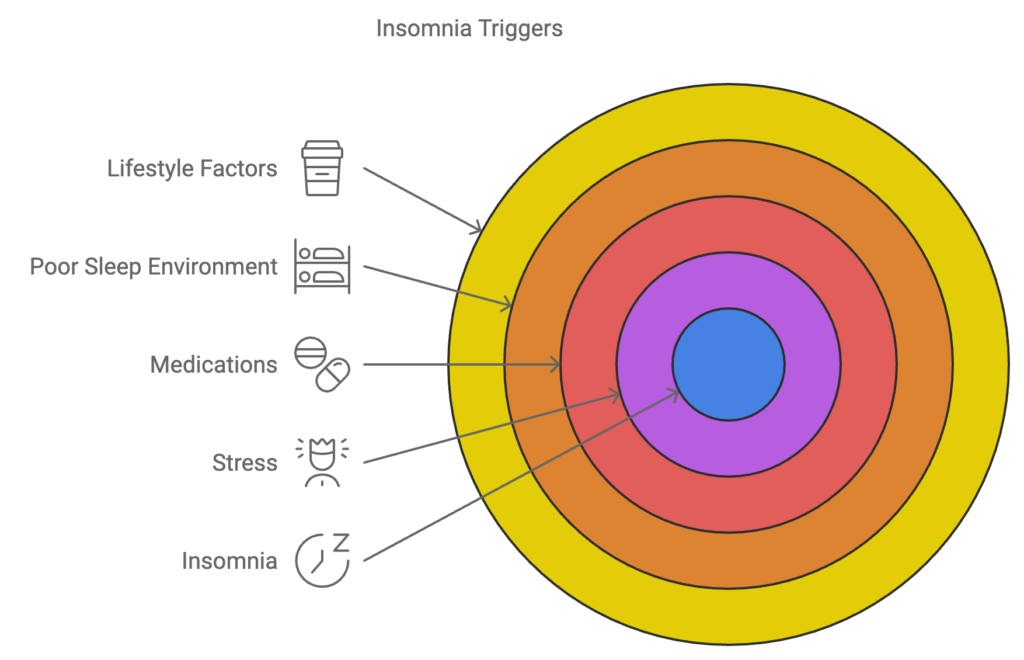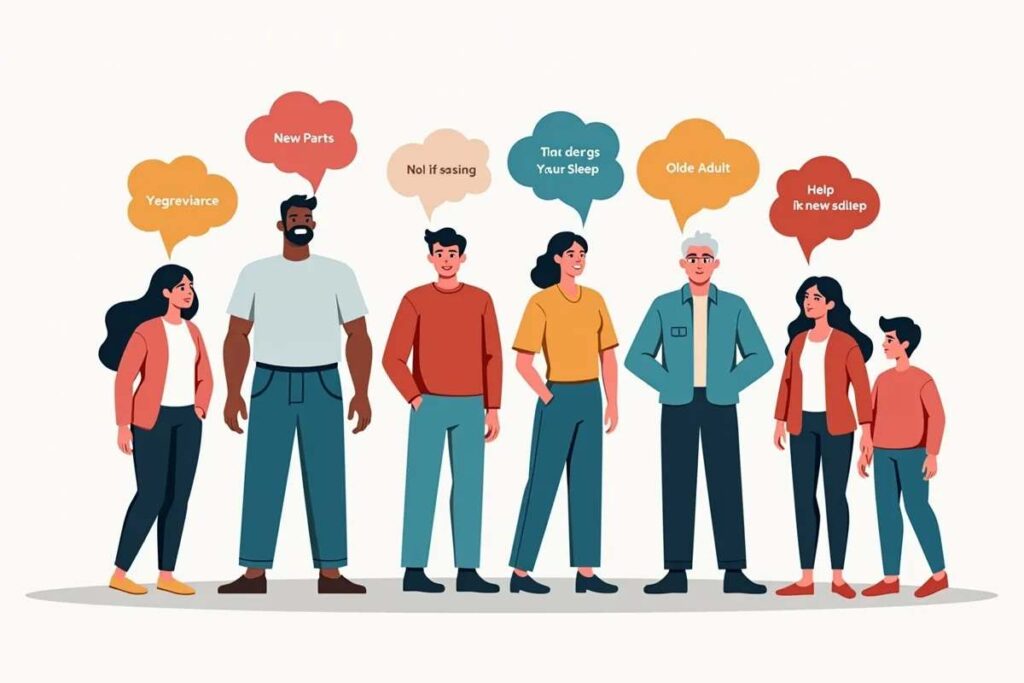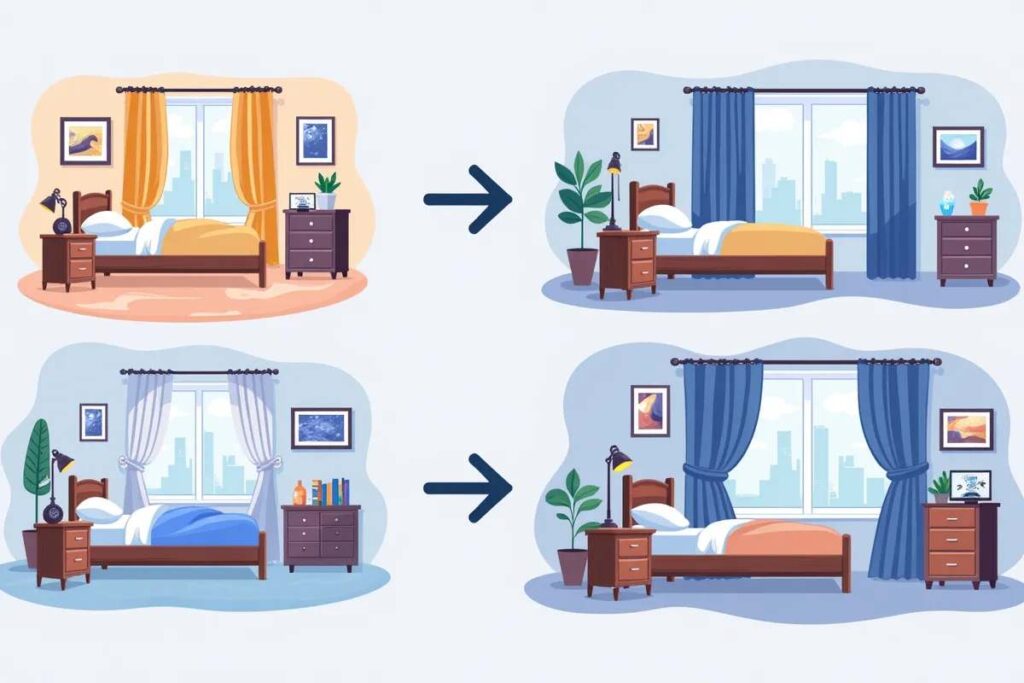Ever felt like you’re in an epic battle with your pillow, tossing and turning while the rest of the world snoozes peacefully? Welcome to the wide-awake club of insomnia sufferers! This sneaky sleep thief doesn’t discriminate – it can strike anyone, from stressed-out students to overworked parents and midnight-shift workers.
But fear not, fellow night owls! Whether you’re staring at the ceiling counting more sheep than a farmer or watching infomercials at 3 AM, understanding insomnia is your first step towards reclaiming your ticket to dreamland. So, grab a cup of chamomile tea (no coffee allowed!), and let’s dive into the world of sleepless nights, exploring causes, consequences, and clever tricks like sleep restriction therapy that might just help you kiss those restless nights goodbye.
Ready to turn your bedroom from a battleground into a haven of sweet dreams? Let’s get started!
Understanding Insomnia
Overview of Insomnia
Can’t sleep? You’re not alone. Insomnia messes with folks of all ages, making it hard to doze off, stay asleep, or get back to snoozing if you wake up too early. Anyone can get hit by it. The aftermath? You’re probably feeling wiped out, cranky, and just not with it during daylight hours.
People battling insomnia often deal with a bunch of stuff, like lousy sleep routines and even some headspace troubles. Figuring out what makes insomnia tick is key if you’re looking to try things like sleep restriction therapy to get better sleep.
“Sleep is the golden chain that ties health and our bodies together.” – Thomas Dekker
Common Causes of Insomnia
Why can’t you sleep? The root of insomnia can come from outside, inside your head, or within your body. Here’s a quick breakdown of what might be causing those restless nights:
| Cause Type | Common Examples |
|---|---|
| Psychological | Anxiety, depression, stress, or past trauma |
| Physiological | Health issues, meds, pain, or general discomfort |
| External Factors | Too much noise, a bed that feels like a rock, or lights too bright |
| Lifestyle Choices | Coffee binges, using other substances, or a sleep schedule that’s more of a sleep guess |
Getting a grip on what kicks off insomnia can help you pinpoint what’s throwing your sleep off balance. If you smell a psychological culprit, peeking into insomnia vs anxiety might shed some light.

Impact of Insomnia on Daily Life
Insomnia doesn’t just steal your Zs; it packs a bigger punch. Your day-to-day life can take a hit, with your body, mind, and mood all feeling the squeeze. Here’s the lowdown on how insomnia can shake up your world:
- Work and School Slumps: Zonked brains struggle with remembering stuff and keeping focus.
- Mood Swings: Chronic drowsiness can make you touchy, unpredictable, and more strung out.
- Body Clock Smackdown: Stretching insomnia out over time can make current health woes worse and raise the stakes for things like heart trouble and diabetes.
To tackle these heavy hitters and check out ways to sleep better like exercise for insomnia or meditation for sleep, try weaving in some sleep-friendly habits. Tying insomnia to general health means you’re a step closer to finding a way to banish those sheep-counting nights.
Introducing Sleep Restriction Therapy
Tossing and turning all night long? Sleep restriction therapy might just be the ticket to better sleep. It’s all about spending less time in bed and, paradoxically, getting more out of your snooze.
What is Sleep Restriction Therapy?
Think of sleep restriction therapy as a clever trick to reset your sleep clock. The plan is simple: match the time in bed to what your tired self truly needs. By shortening your bed time, you’ll sleep more soundly over time. And hey, a regular bedtime routine—never hurts, right?
| Essentials of Sleep Restriction Therapy |
|---|
| Trim down bed hours |
| Boost sleep quality |
| Stick to a regular sleep hour |
How Sleep Restriction Therapy Works
First, you snoop around your sleep habits: how long you linger in bed vs. how long you’re actually in dreamland. With this info, a new bedtime schedule is born—often involving later sack times or earlier wake-ups. Tweak as you go, noting how much better you feel along the way.
| Steps in Sleep Restriction Therapy |
|---|
| 1. Peek at current sleep patterns |
| 2. Set a firm wake-up call |
| 3. Choose a bedtime to start with |
| 4. Keep tabs and make changes over time |
By keeping an eye on your sleep patterns and making changes, you can kick those pesky staying-awake-in-bed habits to the curb.
Benefits of Sleep Restriction Therapy
For insomniacs out there, this therapy packs a punch. It helps you snooze better, spend less time staring at the ceiling, and nails down a regular sleep schedule. The cherry on top? Less fretting about sleep.
| Perks of Sleep Restriction Therapy |
|---|
| Better quality z’s |
| More efficient sleep time |
| Steady sleep pattern |
| Calmer mind about sleep stuff |
This method shines for all sorts of folks: folks wrestling with chronic insomnia, sleep-deprived new parents, or those working strange hours. Wanna know how insomnia buddies up with anxiety? Check out our article on insomnia vs anxiety for the lowdown.

Who Can Benefit from Sleep Restriction Therapy
Sleep problems keeping you up at night? Sleep restriction therapy might just be the friend you didn’t know you needed. It works by focusing on the quality, not just the quantity, of your sleep—time in bed isn’t just for scrolling through memes. Here’s who might really get a kick out of this approach.
Chronic Insomnia Sufferers
Folks with chronic insomnia often feel like they’re doomed to endless nights counting sheep. Sleep restriction therapy offers a way to break free by cutting down on those restless hours in bed, nudging you toward snooze-town. To learn more about wrangling insomnia, see our piece on how to break insomnia cycle.
New Parents Experiencing Sleep Disruption
New parents? Sleep? What’s that? With baby in tow, sleep can seem like a relic of the past. Sleep restriction therapy can help make the most of the sleep you do get by focusing it into quality rest—even if it’s not much. More survival strategies are in our pregnancy insomnia remedies guide.
Shift Workers with Irregular Sleep Patterns
Got a job that keeps your body clock guessing? Shift workers know this struggle well. Sleep restriction therapy might help corral those catnaps into proper rest, regardless of your work hours. Dig into sleep pressure and how it can boost your rest in our sleep pressure article.
Anxiety/Stress-Related Insomnia Cases
Stress and sleep aren’t exactly best buds. Anxiety can leave you wide-eyed and dreaming of rest. Sleep restriction therapy encourages a steady bedtime routine, potentially easing anxiety’s grip. Pair it with something like meditation for sleep for even better Zs.
Older Adults with Age-Related Sleep Changes
Aging often brings along new sleep challenges. Sleep restriction therapy can help older adults regain a bit of control, making those nights feel long and restful again. Sprucing up your sleep spot can help, too—see our sleep hygiene checklist for more on that.
People Taking Medications Affecting Sleep
Medications got your sleep rhythm doing a jitterbug? Sleep restriction therapy might aid in finding a new groove while adapting your patterns. Still, it’s wise to chat with your doctor about any medication side effects. Find more tips on juggling sleep issues and meds in our insomnia vs anxiety article.
No two sleep struggles are the same, and sleep restriction therapy offers tailored relief to fit all types. It’s about finding the right groove to dance through dreamland.
Implementing Sleep Restriction Therapy
So you’re tossing and turning every night like a restless sea sponge? No worries! Sleep restriction therapy could be your ticket to a glorious snooze fest. It’s been a game-changer for folks battling chronic insomnia, new parents desperately craving shut-eye, shift workers, and those whose minds just won’t stop buzzing.
“The best bridge between despair and hope is a good night’s sleep.” – E. Joseph Cossman
Steps to Start Sleep Restriction Therapy
Before you jump into this journey, let’s break down how you can kick off sleep restriction therapy:
Figure Out Your Average Sleep Time: Grab a notepad or open that notes app and jot down your sleep and wake-up times for a week. It’s time to play detective and see how many hours you’re dozing off on average.
Stick to a Wake-Up Time: Pick a wake-up time and commit to it like your life depends on it – even on weekends. Bye-bye, snooze button!
Do the Bedtime Math: Once you know how much sleep you’re getting, set your sleeping schedule by subtracting an hour or two from your average. For example:
| Average Sleep Time (Hours) | Initial Bedtime (Hours) |
|---|---|
| 6 | Midnight |
| 7 | 11 PM |
| 8 | 10 PM |
Note: Over time, as you morph into a sleep master, your schedule will change.
Setting Realistic Sleep Goals
Rome wasn’t built in a day – and neither are improved sleep patterns. Let’s set some attainable sleep goals:
Eye on the Prize – Total Sleep Time: Slowly add more sleep hours as you notice improvements. Snail pace is just fine!
Adjust Your Schedule Like Tweaking a Recipe: Every week or two, alter bedtime based on your progress. If you’re nodding off within 15 minutes, congrats! Give yourself an extra 15-30 minutes of slumber.
Channel Your Inner Zen: Patience, young grasshopper. Mastering sleep, especially if you’ve been struggling for ages, takes time.
Tracking Progress and Adjusting
Time to roll up those sleeves and keep tabs on your progress:
Create a Sleep Diary: No quill or parchment needed – just jot down when you hit the hay, wake up, and rate your sleep quality.
Gadgets and Gizmos A-Plenty: Use sleep trackers, whether digital or old-school recorders, to spy on your sleep stats.
Tweak Accordingly: If you still wake up feeling like a zombie, rethink your strategy and decide if you need to sleep less to sleep more. (I know, crazy.)
With some discipline and a splash of self-observation, your path to blissful sleep isn’t far off. Throwing in some extras like exercise for insomnia or meditation for sleep might just be the cherry on top!

Tips for Success with Sleep Restriction Therapy
Getting the best out of sleep restriction therapy isn’t magic but there are a few tricks that’ll make this venture more worthwhile. Dive into these simple tips to make your journey smoother.
Establishing a Consistent Sleep Schedule
Nailing down a steady sleep routine is like setting a trusty alarm in your brain. Keeping your bedtime and rise-and-shine time the same daily helps train your body’s clock. Check out this handy weekly plan:
| Day | Bedtime | Wake-up Time | Total Sleep Time |
|---|---|---|---|
| Monday | 11:00 PM | 7:00 AM | 8 hours |
| Tuesday | 11:00 PM | 7:00 AM | 8 hours |
| Wednesday | 11:00 PM | 7:00 AM | 8 hours |
| Thursday | 11:00 PM | 7:00 AM | 8 hours |
| Friday | 12:00 AM | 8:00 AM | 8 hours |
| Saturday | 12:00 AM | 8:00 AM | 8 hours |
| Sunday | 11:00 PM | 7:00 AM | 8 hours |
Tweak it to fit your own life, but try sticking to it like glue for best results.
Creating a Relaxing Bedtime Routine
Before hitting the sack, setting a chill-out routine tells your body it’s time to switch off. Do stuff that relaxes you, like:
- Reading a Book: Choose something easygoing and fun.
- Taking a Warm Bath: The cool-down afterward makes you feel sleepy.
- Practicing Meditation: Check out our meditation for sleep; it’s a mental cool-down session.
- Listening to Soft Music: Tunes that are mellow put you in a peaceful zone.
These simple routines can make sleep restriction therapy more effective and crank up the quality of your snooze.
Limiting Stimulants Before Bed
Stimulants like caffeine and nicotine can be like tiny enemies fighting your sleep. Keep these at bay, especially close to bedtime. Also, avoid blue light from screens to help you nod off. Here’s a look at some common stimulants:
| Stimulant | Recommended Cut-off Time |
|---|---|
| Caffeine (coffee, tea, soda) | 6 hours before bed |
| Nicotine (cigarettes, vaping) | 4 hours before bed |
| Energy drinks | 8 hours before bed |
Giving these things a timeout will amp up the rewards of sleep restriction therapy.
Managing Stress and Anxiety through Relaxation Techniques
Stress and anxiety can play havoc with your snooze time. Simple relaxation techniques slotted into your routine can help chill your mind. Try these out:
- Deep Breathing Exercises: Inhale, exhale—do it slowly to ease the tension.
- Progressive Muscle Relaxation: Tense and then loosen up every muscle from your toes to your head.
- Gentle Yoga Stretching: Stretch it out to let go of physical tension and calm your nerves.
By bringing these methods into your life, you can better control your mental state, boosting the impact of sleep restriction therapy. For more wisdom, peek at our article on insomnia vs anxiety.
Conclusion
As we wrap up our journey through the land of insomnia, it’s clear that the path to better sleep isn’t always a straight line – it’s more like a winding road with a few bumps and detours along the way. But armed with knowledge about the causes of sleepless nights, the impact on daily life, and innovative approaches like sleep restriction therapy, you’re now better equipped to navigate this challenging terrain. Remember, whether you’re a chronic insomniac, a new parent, a shift worker, or just someone going through a rough patch, there’s hope for better sleep on the horizon. It might take some patience, a bit of trial and error, and maybe even a new bedtime routine (goodbye, midnight scrolling!), but restful nights are within reach. So, as you embark on your quest for quality Zs, keep in mind that every small step – from setting a consistent wake-up time to creating a relaxing pre-sleep ritual – is a victory in itself. Sweet dreams aren’t just for fairy tales; with the right approach and a little perseverance, they can be your reality too. Here’s to nights filled with peaceful slumber and mornings that don’t require a gallon of coffee!
FAQs
Q1: How long does insomnia typically last?
A1: Insomnia can be short-term (acute), lasting a few days to weeks, or chronic, persisting for a month or more. Acute insomnia is often triggered by stress or changes in environment, while chronic insomnia may require more comprehensive treatment.
Q2: Can lifestyle changes really improve insomnia?
A2: Yes! Simple changes like maintaining a consistent sleep schedule, creating a relaxing bedtime routine, limiting caffeine and screen time before bed, and regular exercise can significantly improve sleep quality for many people with insomnia.
Q3: Is sleep restriction therapy safe for everyone?
A3: While sleep restriction therapy is generally safe and effective, it’s not suitable for everyone. People with certain medical conditions, bipolar disorder, or those operating heavy machinery should consult a healthcare provider before starting this therapy.
Q4: How long does it take to see results from sleep restriction therapy?
A4: Most people start to see improvements within 2-3 weeks of consistently following sleep restriction therapy. However, it can take up to 3 months to achieve optimal results.
Q5: Can insomnia be cured completely?
A5: While insomnia can be effectively managed and treated, it’s not always “cured” in the traditional sense. Many people find that maintaining good sleep habits and addressing underlying issues (like stress or anxiety) helps keep insomnia at bay long-term.
- Additional resources and authority references:
- National Sleep Foundation:
- https://www.sleepfoundation.org/insomnia
- American Academy of Sleep Medicine:
- https://sleepeducation.org/sleep-disorders/insomnia/
- Mayo Clinic:
- https://www.mayoclinic.org/diseases-conditions/insomnia/symptoms-causes/syc-20355167
- Sleep.gov:
- https://www.nhlbi.nih.gov/health-topics/insomnia
- Cognitive Behavioral Therapy for Insomnia:
- https://www.ncbi.nlm.nih.gov/pmc/articles/PMC3481424/








